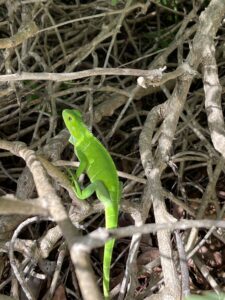If you reside in South Florida, chances are you might have encountered a surprising sight in your backyard – iguanas! These vibrant reptiles are not native to the state but have become a common sight due to a combination of factors. In this blog post, we will explore why iguanas are found in Florida backyards and what attracts them to these urban environments.
Favorable Climate:
One of the primary reasons iguanas have thrived in Florida is the state's warm and subtropical climate. Iguanas are cold-blooded reptiles that rely on external sources of heat to regulate their body temperature. Florida's mild winters and ample sunlight provide an ideal habitat for them to bask and stay active throughout the year.
Escaped or Released Pets:
Iguanas are frequently kept as exotic pets due to their striking appearance and docile behavior when young. Unfortunately, some pet owners release these animals into the wild when they become challenging to care for or outgrow their enclosures. Escaped or abandoned iguanas can adapt to the Florida environment and establish wild populations, leading to their presence in backyards and urban areas.
Abundance of Food:
Iguanas are herbivores and thrive on a diet of plants, flowers, fruits, and leaves. Florida's diverse vegetation, including gardens and ornamental plants, provides a readily available food source for these reptiles. Backyards with lush vegetation are especially attractive to iguanas, making them more likely to frequent residential areas.
Nesting Sites:
Iguanas are opportunistic nesters and seek out safe and secluded spots to lay their eggs. Backyards with dense foliage, overgrown shrubs, and underbrush can serve as suitable nesting sites for female iguanas. Consequently, these areas become attractive habitats for the species.
Lack of Natural Predators:
In their natural habitat, iguanas have natural predators that help keep their populations in check. However, in Florida, they face fewer predators, allowing their numbers to grow unchecked.
The presence of iguanas in Florida backyards is a result of several factors, including the state's favorable climate, the release of pets into the wild, abundant food sources, and suitable nesting sites. While these reptiles can be fascinating to observe, it's essential to remember that they are non-native species and their growing populations can impact the local ecosystem. If you encounter iguanas in your backyard, it's best to take a cautious and respectful approach. Reach out to one of our property managers for tips, tricks and referrals to a local removal company.

